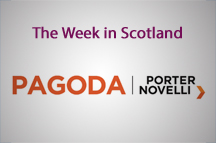 St Andrews Day was marked by legislation being laid confirming Scotland’s new tax powers. From 2017/18 the Scottish Parliament will be able to set the rate and band thresholds for income tax, excluding personal allowance.
St Andrews Day was marked by legislation being laid confirming Scotland’s new tax powers. From 2017/18 the Scottish Parliament will be able to set the rate and band thresholds for income tax, excluding personal allowance.
Finance Secretary Derek McKay indicated that changes will be minimal. SNP policy is to keep income tax rates the same as in the UK, but not to pass on the increase in the threshold at which the 40p rate starts.
And on Scotland’s day of national celebration a YouGov poll for The Times found that support for Scottish Independence has for the first time dropped below the 45% achieved by Yes campaigners’ in 2014. Support for separation now stands at 44% and for the Union at 56%. More revealingly the poll found that only 31% wanted the Scottish Government to campaign for independence in the next two years with 56% saying it should not. Even among those who voted Yes in 2014 only 60% took the view that the Government should campaign for independence in the short term.
The poll’s findings contrast with the SNP’s expectation that Brexit would increase support for separation. While in the immediate aftermath of the EU vote there was a limited rise in support for independence, pollster John Curtice believes that the SNP’s strategy of linking independence to EU membership had eroded support for their core policy.
Meanwhile First Minister, Nicola Sturgeon, continued her Brexit tour around Europe’s capitals, this week taking in Dublin, addressing the Irish Parliament’s Upper House. She continues to seek support for a separate deal that would allow Scotland to remain in the Single Market even if the UK were to leave. She told business leaders that she would be in favour of a “Celtic corridor” of closer cooperation between Scotland, Northern Ireland and the Republic.
 It may be that the First Minister’s focus on Brexit to the exclusion of tackling service delivery problems in Scotland-most notably problems with the ScotRail Franchise - is starting to erode the SNP’s popularity. YouGov found that Holyrood voting intention support for the SNP had fallen by four points in the constituency vote and by six points in the regional list vote. The chief beneficiaries were the Scottish Conservatives whose support rose by four points in both.
It may be that the First Minister’s focus on Brexit to the exclusion of tackling service delivery problems in Scotland-most notably problems with the ScotRail Franchise - is starting to erode the SNP’s popularity. YouGov found that Holyrood voting intention support for the SNP had fallen by four points in the constituency vote and by six points in the regional list vote. The chief beneficiaries were the Scottish Conservatives whose support rose by four points in both.
And Scottish Tory leader, Ruth Davidson MSP, continues to outshine the First Minister in personal approval ratings. Ms Davidson’s rating of 25 is more than twice that of the First Minister’s.
Meanwhile Scottish Labour continues on its journey to becoming an electoral irrelevance. The party’s position has not been helped by Unite’s Len McCluskey whose limited understanding of Scottish politics continues to undermine Labour. His suggestion that UK Labour might have to reach a deal with the SNP is unlikely to boost Labour’s popularity north of the border. His ongoing campaign to undermine Kezia Dugdale might result in yet another leadership campaign following next May’s local elections.
Politics is changing is Scotland that few could have predicted just a decade ago when Labour still dominated the agenda at a local and national level.














